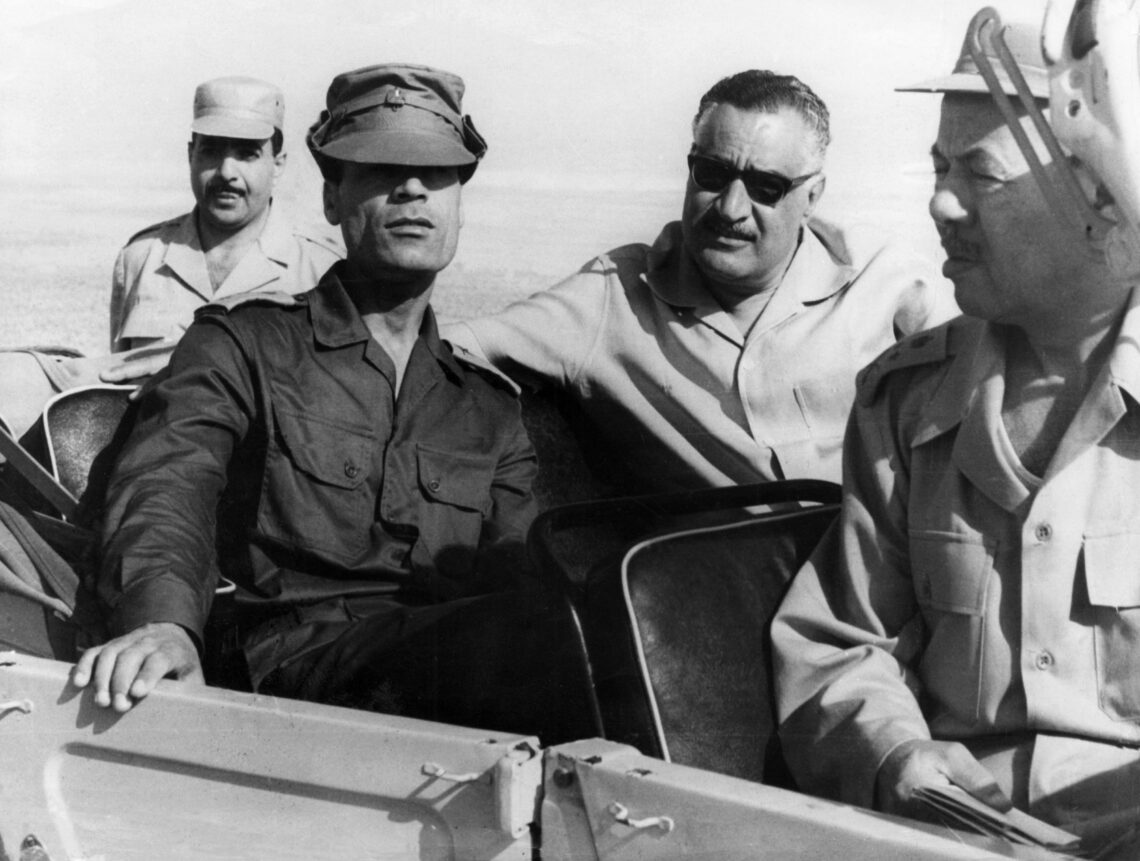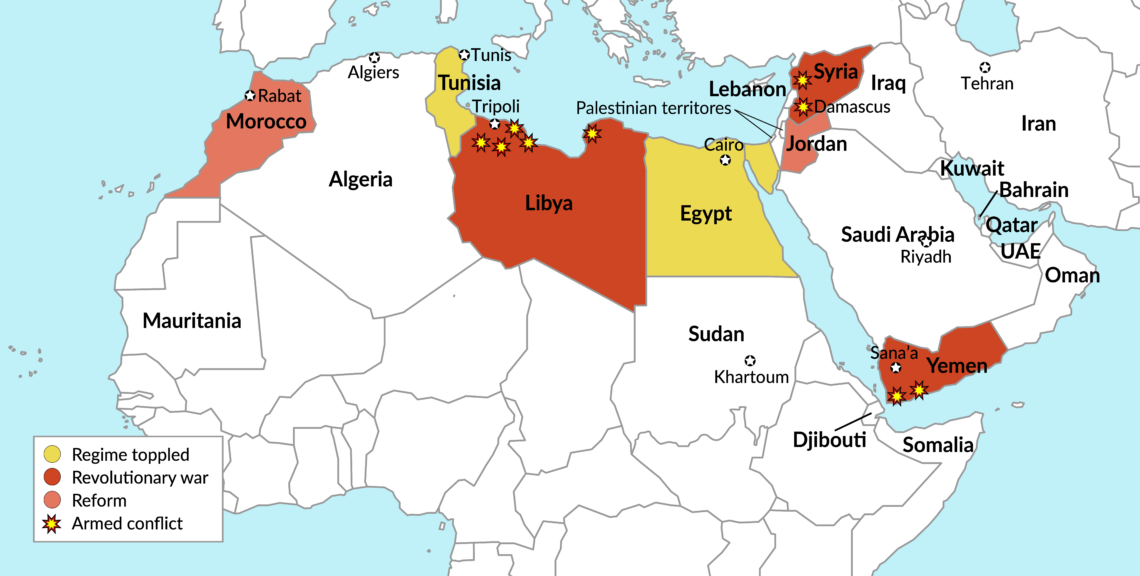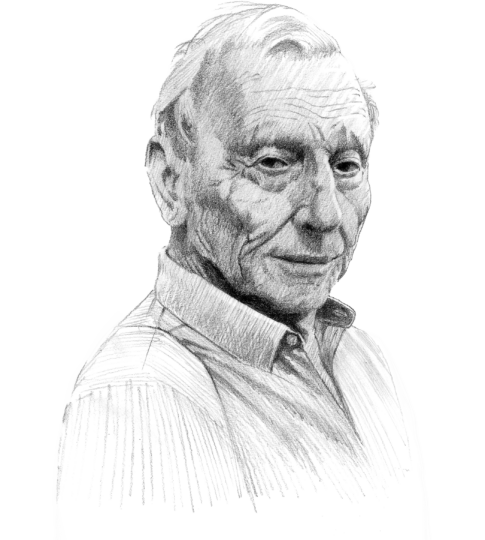Europe’s waning influence in the Middle East
Once a key player, Europe’s role in the Middle East is steadily fading. Even conflicts that had a direct impact on European states are being ignored. Turkey and Russia have since filled the power vacuum left by the EU.

In a nutshell
- Europe's role in the Middle East has ceased to exist
- Turkey and Russia have stepped in instead
- The EU will need U.S. support to regain its standing
During the turbulent decades following World War II, European countries’ influence in the Middle East slowly eroded. This is a startling development, taking into consideration the region’s proximity and strategic importance, as well as its colonial past.
France, through its North African territories, and the United Kingdom, which ruled Egypt and Iraq and controlled the Gulf states, have failed to acquire a better understanding of Arab and Islamic cultures. Neither country has developed close relationships in the region since the end of the colonial era.
The two great powers, which were instrumental in shaping the new states born of dismantling the Ottoman Empire, were reluctant to let go of their colonies. Algeria’s fight for independence resulted in a drawn-out and bloody war that left lasting scars. In 1956, the UK and France – with the help of Israel – launched an ill-fated expedition to take over the Suez Canal after it had been nationalized by then Egyptian President Gamal Abdel Nasser. They failed due to opposition from Russia and the United States, in a rare show of common interest that did not last. With the French and British out of the picture, Washington and Moscow then extended their Cold War to the region.
Europe did not keep track of what was happening in its own backyard.
The 27 countries of the European Union, with their combined population of 500 million, ended up sidelined in dramatic conflicts that have endangered their own security, not to mention their political and economic interests. In the Middle East, the emergence of nationalist movements led to military clashes and violent revolutions that crowned leaders such as Nasser, Muammar Qaddafi, Saddam Hussein and Hafez al-Assad. Then came the Islamic backlash – both Sunni and Shia – that led to Iranian and Turkish interventionism, as well as jihadi movements such as al-Qaeda and Islamic State.
Because of its lack of involvement in the region, Europe found itself powerless to stem the millions of refugees displaced by the fighting. It had to close its borders despite the EU charter. When this did not suffice, it found itself constrained to pay billions of dollars so that Turkey would prevent refugees from leaving its shores. This dependence hinders EU capacity to intervene in new flare-ups caused by Ankara’s “neo-Ottoman” policy, which aims at regaining territories formerly part of the Ottoman Empire.
Europe and Israel
Post-World War II Europe, busy rebuilding its economy and infrastructure while setting up the institutions that later became the EU, did not keep track of what was happening in its own backyard. Now, its stance on two of the major issues challenging the stability of the Middle East today, the Israeli-Arab conflict and Iran’s dogged pursuit of nuclear weapons, have further reduced its influence.
Facts & figures

The Israeli-Arab conflict has long been the touchstone of relations between Europe and the Arab world. It has been suggested that many European countries saw in the creation of a Jewish state a way of atoning for the centuries of persecution that led to the Holocaust. Traditionally, European countries favored the Arab states who supplied the oil they badly needed and provided a ready market for their weapons industries.
However, France in particular helped Israel’s fledgling defense industry and even assisted in the creation of a nuclear reactor “for research purposes.” Their cooperation culminated in the joint Suez operation mentioned above. The break came after the Six-Day War and the ensuing Arab oil embargo which sent Western economies reeling. Much later came several initiatives aiming to bridge the gap between Israel and Arab countries. Ultimately, only a number of bilateral economic agreements were concluded, none of which touched upon the conflict.
With Europe out of the game once again, new alliances are emerging.
Europe then began advocating the creation of a Palestinian state in the West Bank and the Gaza strip before any normalization with the Arab states could be implemented, even though both Egypt and Jordan had made peace with Israel. While the latter actively pursued other routes to its neighbors, Europe continued condemning the Jewish state for taking steps that it argued harmed chances of finding a solution.
Nevertheless, 40 percent of Israel’s international trade is carried out with the European Union and there are extensive economic, scientific and aviation agreements. Israel also participates in the Horizon 2000 European project for innovation in scientific research and development and Israeli research institutions benefit from substantial grants.
Disruptive forces
The 2011 Arab Spring, which was backed by the West at first, did not live up to expectations. Syria plunged into chaos, with the subsequent flood of refugees to Europe. In Libya, the French-backed downfall of Qaddafi left the country hopelessly divided. The U.S. is weighing in, notably concerning Iran, but its interventions in Iraq and in Syria are undermined by Washington’s intention to withdraw from the region. China is also present, but mainly for economic reasons such as the promotion of its Belt and Road Initiative.
The fight against the al-Qaeda surrogate al-Nusra Front and the Islamic State in Syria and Iraq marked the last joint U.S.-EU intervention in the region. The EU’s participation was “nonmilitary” but individual states such as France, the UK and the Netherlands did send warplanes for bombing raids. Germany sent refueling planes and provided humanitarian assistance. No European country sent in ground troops – apart from small select intelligence or training units.
With Europe’s receding role in the Middle East, new alliances are emerging, transforming the region. Russia, Iran and Turkey are now the main players. They are searching for a solution to the Syrian problem fitting their respective interests in the Astana Economic Forum set up by Moscow for that purpose, as well as holding informal consultations on other regional issues.
There are now three disruptive political and military forces with conflicting agendas threatening the stability of the region: Iran, Turkey and jihadi movements, facing a front of pragmatic Sunni Arab countries backed by the U.S. and, more recently, Israel because of the Iranian threat. Europe appears indifferent to Iran’s attempts to destabilize Iraq, Syria, Yemen and Lebanon.
France and the UK, members of the UN Security Council, along with Germany, took part in the negotiations with Iran on the nuclear deal. Along with the U.S. under former President Barack Obama, they signed on to the agreement. It did not result in the destruction of Iran’s nuclear installations and imposed restrictions for a period of only 10 years. Iran will then be officially able to manufacture nuclear weapons with Europe well in range of the ballistic missiles it is still developing. Yet European countries set up a work-around to circumvent American sanctions.
France, which prides itself on having brought Lebanon into being and on still being its protector, did nothing to prevent the Hezbollah takeover and its instrumentalization of the country in its fight against Israel. Paris refuses to brand Hezbollah as a terror movement. Given France’s dwindling influence, President Emmanuel Macron should not have been surprised at the failure of his initiative to promote the formation of a national unity government to help reconstruction efforts after the blast in Beirut.
The EU, which also does not want to affix the terrorist label to Hezbollah, is not faring any better. The Netherlands has done so, followed by the UK when a Hezbollah cell stocking ammonium nitrate was discovered in a London suburb. Recently, Germany also condemned the organization because of American pressure and the growing number of Hezbollah militants on its soil.
A similar process is underway regarding Turkey. The country set up military outposts in Qatar and Somalia, launched strikes on Iraq and took over parts of Syrian Kurdistan, with some 300,000 new refugees escaping combat zones. Ankara is hosting several key figures of the Muslim Brotherhood who fled from Egypt, as well as Hamas terrorists plotting attacks in the West Bank. Even President Recep Tayyip Erdogan’s aggressive policy against Cyprus and Greece did not trigger a strong response from the European Union, although France did dispatch warships to the area to show its support to Greece.
Europe’s role in the Middle East is more apparent in Libya, perhaps because it was partly responsible for the fall of the Qaddafi regime that unleashed the ongoing bloody civil war. But European states are far from presenting a united front, and each acts according to its own interests. France backs the ruler of eastern Libya, General Khalifa Haftar, as do Russia, Egypt and the United Arab Emirates. Italy sides with Fayez al-Sarraj, head of the UN-backed Government of National Accord, whose regime is dependent on the support of the Muslim Brotherhood militias and Turkish military assistance. The last European effort to show an assertive involvement in the crisis was the Berlin Conference of January 2020 but its decisions were never implemented. In the end, it was a deal between Russia and Turkey that led to a cease-fire and the start of the currently ongoing talks.
No single voice
Lacking a unified voice on Middle East issues, NATO is practically impotent. Furthermore, there are serious divergences of opinion between the U.S. and Europe regarding other critical issues, such as China. President Donald Trump berates Europe for not bearing its fair share of the costs of the defense organization. The new and closer relationship between Turkey and Russia is another source of embarrassment. Ankara acquired the sophisticated S400 Russian anti-missile system which can reportedly provide information on American systems.
The normalization agreements recently signed between Israel, Bahrain and the Emirates took the EU by surprise, though the deals had been in preparation for a long time, with quiet but steady support from Washington. The first reactions were tepid, if not cold. But it has slowly sunk in that the move is irreversible, that more Arab countries could follow, and that the solution to the Palestinian issue will come later. In fact, the EU-Israel Association Council, which had been dropped in 2013 as a form of protest against Israeli policy toward Palestinians, could be reestablished, and talks between EU Commissioner for Foreign Affairs Joseph Borrell and Israeli Foreign Minister Gabi Ashkenazi are underway.
Diplomacy and humanitarian aid no longer cut it in the Middle East.
Can Europe adjust its views, speak with a single voice, be ready to take an active stand and even send ground troops before Europe’s role in the Middle East erodes even further? Diplomacy and humanitarian aid no longer cut it in the Middle East.
Thus far, France is the only country to have launched a military operation – in the North African Sahel region – to help former French colonies fight jihadi organizations. Several French soldiers have been killed. President Macron took the unprecedented step of condemning radical Islam and announcing measures to combat rampant “Islamic separatism” in France. For that, Egypt’s Grand Imam of Al-Azhar did not hesitate to condemn him. The Turkish president said the program was “a clear provocation” and a proof of the French leader’s “impertinence.”
Time is running out for European countries. Will a divided Europe – and NATO – find the resolution and strength for a new beginning as the world struggles with a deadly virus? With the help of the U.S., it could.








